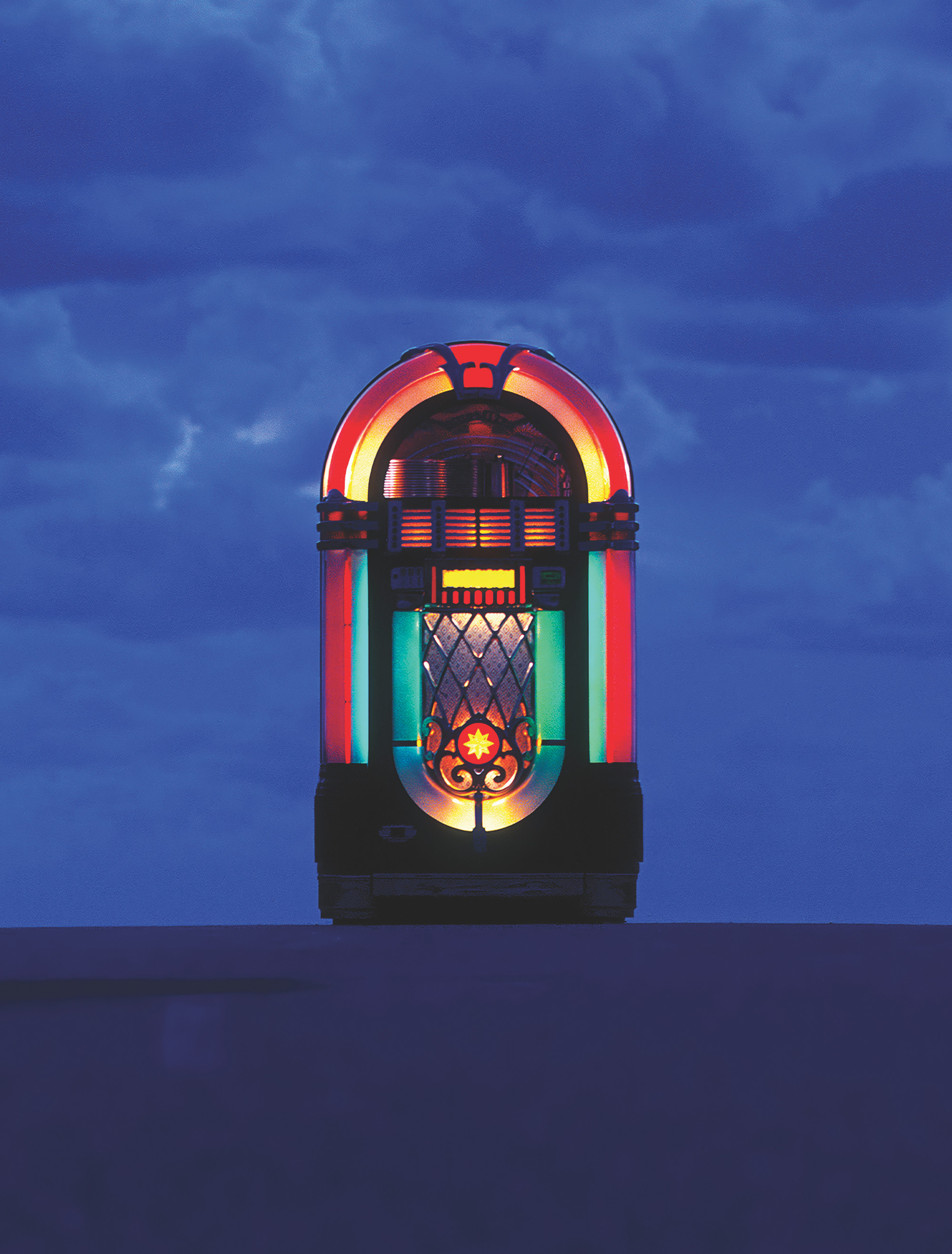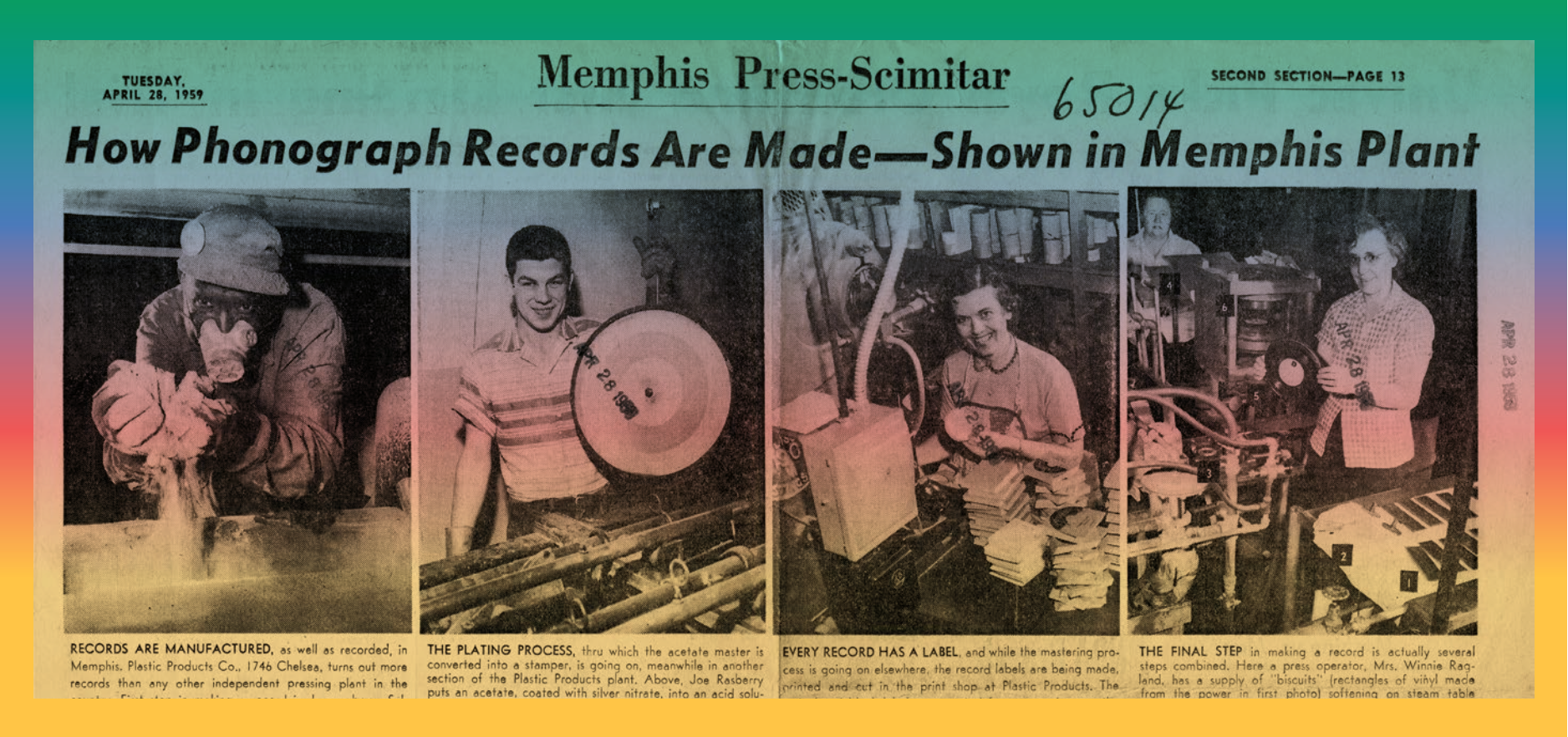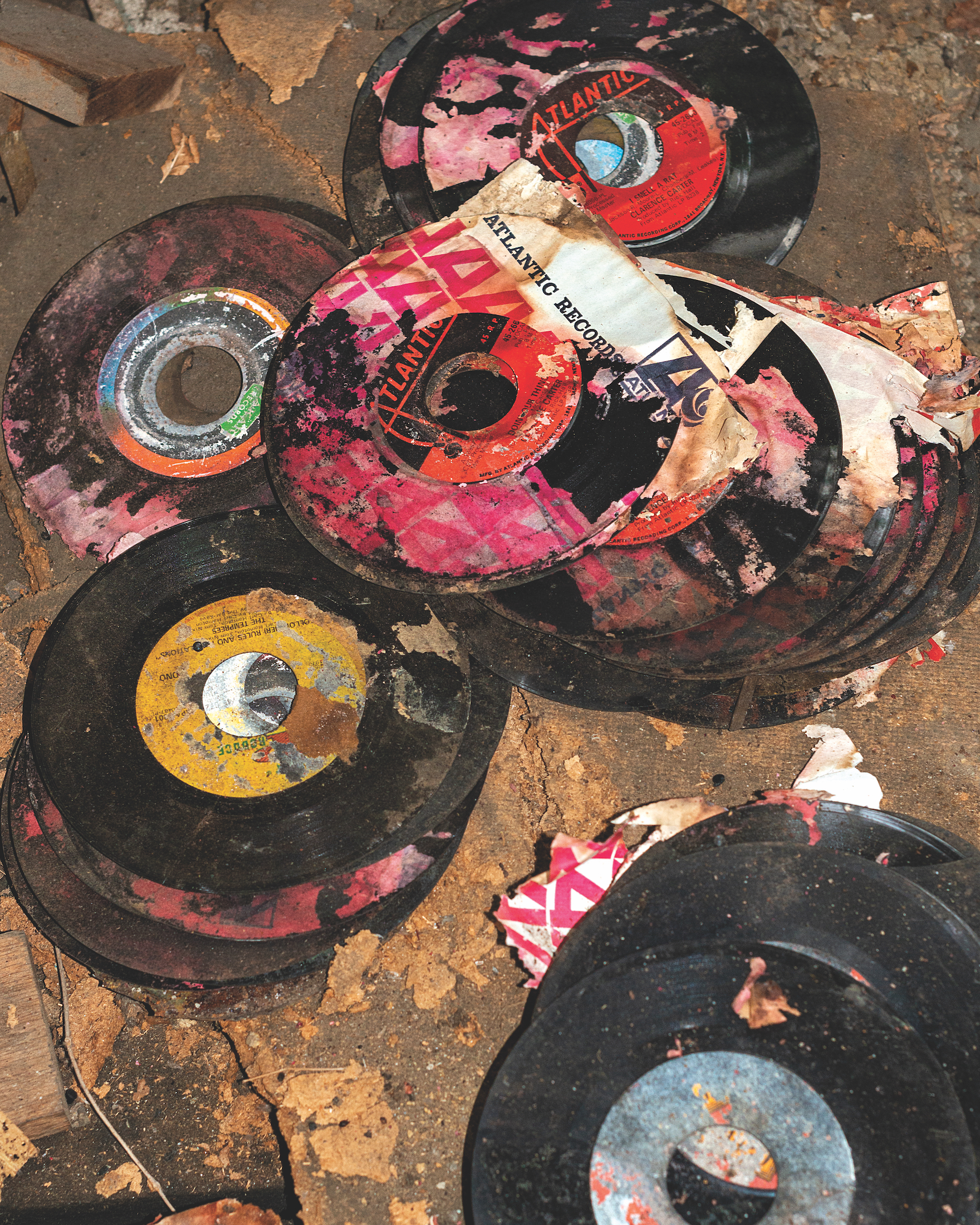How Jukeboxes Made Memphis Music
When R.E. Buster Williams ruled jukeboxes and jukeboxes ruled music
By Robert Gordon

Jukebox, 1982, photograph by Pete Turner © The artist
Nashville is where you go to make a hit that sounds like everyone else. Memphis is where you make a hit that sounds like no one else. That’s what distinguishes the record labels, recording studios, and recording artists that Memphis is known for: They stayed in Memphis to pursue their independent visions outside the corporate headquarters in Nashville and on the coasts.
Those opportunities didn’t just materialize out of BBQ-scented air. Preceding all the great Memphis artists and records, there’s a peanut vendor who cultivated the seeds of fortune for independent entrepreneurs like himself, establishing the terrain that continues to encourage that cornucopia of great music.
R. E. “Buster” Williams owned the record pressing plant, the record distributorship, and the jukebox machines in the beer joints and soda fountains where the records were played. He owned the routes that serviced the jukeboxes and that supplied the records. He was everything except the record company. For companies like Sam Phillips’s Sun Records and Leonard Chess’s Chicago-based Chess Records—even Jim Stewart at Stax—Buster could help them get started by pressing a thousand records on credit. Buster could gamble the pressing costs on a new company’s song in exchange for a few hundred free copies on his jukeboxes and the promise of payment if the label sold their few hundred.
Taking the chance on an unknown artist was really a pretty safe bet because Buster’s jukebox route operators—the guys who serviced all the locations—would pay Buster’s distribution company, which would pay Buster’s pressing plant; his inter-company profit mitigated the expense of the pressing, which Buster could potentially collect anyway. His companies were a terrarium for experimentation.
Buster Williams began figuring out how things worked as a preteen. Born in 1909 in Enterprise, Mississippi, he was selling peanuts at twelve years old, preserving their freshness in a wax paper bag, easily sealed because he was an expert at steam engines. Two years later, he was head man at a local cotton gin. He designed his own wheat thresher, developed a machine that would separate peas from their pod, and modified the electrical system on a Ford Model T, adding a larger coil to increase the car’s voltage.
But his path to record man was set when he bought a drugstore at sixteen. “There were several slot machines and that’s what got Dad’s interest in coin-operated machines—he saw what kind of profits those things turned,” says his son Robert Williams, who has his own legacy of high-end designs in speakers and turntables.
Round coins soon propelled round vinyl records into the center of Buster Williams’s world, making him the cog that drove the Memphis regional music industry during the heady days from the 1950s into the 1970s.
Jukeboxes began appearing in the late nineteenth century, rising in popularity during the 1930s. The “nickelodeon” was replacing player pianos and other pneumatic-based musical entertainments; hearing an actual band’s recording was more intimate. And the jukeboxes had their own sound effects—the rattle of the coin going in, the click of buttons that select the song, the whir of the selector riding to the pick, and then the listener’s Pavlovian anticipation triggered by the surface noise as the needle hit the vinyl: Music is about to flow.
After World War II, Buster made his way to Memphis, the bright lights on the distant horizon where promise could be fulfilled. He established the Williams Distributing Company, “primarily a jukebox and pinball machine distributor,” says his son. “He committed to Wurlitzer jukeboxes, and he covered western Tennessee, Mississippi, Louisiana and into the bootheel of Missouri.” A 1959 Memphis newspaper article states that Williams Distributing was the nation’s largest jukebox operator, with over 18,000 machines. In addition to owning routes where his employees serviced his jukeboxes, he also sold the machines to others, who competed with his operators to establish their own routes—and who soon came to Buster to buy records.
“Each jukebox operator specialized in one brand,” says Morse Gist, a Wurlitzer man who got into the business around the same time Buster did. “That way you could have interchangeable parts that would fit several different models.”
Gist owned his own jukebox route in Helena, Arkansas. That is, he put machines he owned in bars, diners, and other locations, and he serviced them, updated the records, and then split the machine’s revenue with the proprietor of that location. Gist’s route was his own, and though he likely bought his jukeboxes from Buster’s Wurlitzer distributorship and his independent-label records from Buster’s Music Sales Company, Gist competed for locations against Buster’s route operators.
To get customers, an operator would scout his territory. “You’d read the newspaper public notices for beer applications,” Gist says in an interview conducted for the Smithsonian’s Memphis Rock ‘n’ Soul Museum. “Beer joints were the best. Whether that was a grocery store in the country or a honky-tonk on the highway or a nightclub in town—anywhere they would stay ’til the early hours of the morning playing the jukeboxes. It almost had to be beer consumed on the premises to make the jukebox worthwhile.”
In the mid-1930s, a patron could put a nickel in the “automatic entertainer” and select which song they wanted to hear. (Until 1948, machines could only play one side of the record.) “On these old Wurlitzers, man, you could service those things every day, the money would be running over the coin box all down on the floor inside the machine,” says Leon McLemore, who went from operating a route for Buster Williams to managing his record distributorship and then the pressing plant.
Initially, the newfangled machines were such an attraction that the club owners didn’t even think of asking for part of the take. The machine, which they had not requested and for which they’d paid nothing, was drawing the crowd and they were selling more beer. But jukeboxes spread in popularity, resulting in competing vendors, and bar owners soon leveraged their position to get half of the machine’s take. “In Monroe, Louisiana,” McLemore told me, “we had a few bars that made more money off the jukeboxes and gaming machines than they did out of the bar.”
Early jukeboxes did not meter which records got more plays. “You learned to look at the record,” explains Gist, the Helena, Arkansas, operator. “The more times the seventy-eight played, the more it would gradually descend from a very shiny ebony to a white powdery marbleized color.”
At each location, operators had to not only maintain the machines but also change the records. Each stop could take an hour, including making repairs, updating the selections, chatting with the proprietor, and driving the country miles between locations. In addition to whatever records a bar owner requested, a jukebox operator would also carry multiple copies of the latest releases from B. B. King or John Lee Hooker for the Black clubs, Hank Williams or George Jones for the white clubs. And if they knew a previous record had been hot, they’d carry fresh copies of that title. “If I didn’t have a replacement,” says Gist, “I’d leave the worn one on there. Often, I couldn’t hear a word of the music. It’d all sound scratchy to me—but they wanted to hear it again!”

From the Memphis Press-Scimitar, April 28, 1959. Courtesy Special Collections Department, University Libraries, University of Memphis
As demand for jukeboxes from Williams Distributing grew, so did the jukeboxes’ need for more records. In 1945, Buster established the Music Sales Company, a distributorship for independent record labels. Four years later, filling another void, he built a record pressing plant, Plastic Products, that grew to four Quonset huts at 1746 Chelsea Avenue.
Before Music Sales, jukebox operators would come to Memphis and have to visit each major label’s warehouse to pick up that company’s product—meaning there were at least four stops: RCA, Columbia, Decca, and Capitol. Then, to collect popular local releases, he’d have to visit a backhouse in North Memphis or a converted garage in South Memphis—various random locations spread around the city, and often just to get a single title. It was a very full day’s work.
With Music Sales, all the indies had a single market where their product could be sold, allowing jukebox operators to make a single stop and collect a variety of independent and local releases. Leon McLemore joined Music Sales around the time the pressing plant was cranking up, and he became manager of the indie distributorship. “As a record distributor, we handled all the doggone indie labels,” he says. “Indie producers could press at Plastic Products, then Music Sales would get the independent records exposed. Some records, you might sell one a year, but we probably had a hundred different labels.” On top of the day spent in Memphis shopping, Morris Gist was driving two hours each way from Helena. Music Sales saved him lots of time.
Each warehouse counter became its own little pre-internet chat room. Regional jukebox operators would move through Memphis, warehouse by warehouse. “Even though they were competitors, they were good friends,” McLemore explains. “They’d come into Memphis and have a ball. Whoever’s working the Music Sales counter would be selling to several operators simultaneously. They’d argue about which records were good. And there’d be label representatives to come through, and sometimes artists would hang around to push their records.”
“You stood at the counter and listened to records, talked to the clerks—always asking, What is everybody else buying?” says Gist. “I couldn’t afford buying everything that they came out with at every spot, and my purchases were often nothing more than a tremendous amount of guesswork.”
By the 1950s, jukeboxes were as influential as radio in breaking hits. From 1943 until 1957, the industry trade magazine Billboard maintained a hit chart based on jukebox plays. “Popularity meters” that counted plays of each record were becoming standard on the machines by the 1940s, though operators often ignored them to push their own favorite records. If Thomas Wayne’s “Tragedy,” from the South Memphis Fernwood label, was taking off in one joint, operators would put that record elsewhere, and they’d replace worn-out copies again and again. If Buster wanted to help a small label like Fernwood, he could report higher plays of “Tragedy,” which would prompt others outside of the region to give the record attention. “Tragedy” eventually hit No. 5 on Billboard’s Top 100 chart.
A mogul like Buster Williams who serviced operators with multiple routes and whose machines were wearing out multiple copies of the latest from Bobby “Blue” Bland or Johnny Cash played a big part in making a hit. “Over a period of time,” says Leon McLemore, the manager at Williams’s Music Sales, “we could distribute forty or fifty thousand copies of a record.” The Music Sales distributorship played a role in establishing careers for all the Sun Records artists, many Stax hits, Al Green at Hi—pretty much all the familiar names established on indie labels. Buster’s operation accrued a lot of power.
The major labels controlled the record pressing plants, and work for the independent labels was often bumped to the back of the line. But at Buster’s Plastic Products, indies got respect and soon they were coming from all over the nation. Manhattan’s Atlantic Records, which would grow into a major label, was one of their leading clients. By 1956, Plastic Products was at capacity, pressing records in three shifts around the clock, using a vinyl compound that Buster created.
To expand, Buster bought a former cheese factory in Coldwater, Mississippi. “We put in a hell of a plant down in Coldwater,” says McLemore, who worked closely with Buster. “We had ninety-seven presses at one time down there, and we were shipping two hundred and twenty-five thousand records a day out of Memphis, three shifts a day. Tonnage wise, Coldwater was the largest shipper that Delta Airlines had for a couple of years. We’d send a truckload of records into the airport every night.” The records pressed by Plastic Products were shipped all over the country.
Ray Charles might have recorded at Atlantic’s studio in New York City, but the record that a customer bought in Washington state, or Peoria, Illinois, or some small store near a Florida swamp began its trek to that store’s shelf when it was pressed in and shipped from Memphis. And if a record was breaking out, the demand might warrant truckloads leaving the plant for the airport several times a day. “You lose sales when you don’t make it onto shelves with a hot release,” says Buster’s son Robert, “so a lot of them went out by air, twice a day.”
“Jukebox play was the best way to exploit a record in those days,” says McLemore, “and that’s what we did—get ’em played.”
With Buster’s operation established, Memphis’s recording industry began. Memphis had always drawn the region’s talent, with traveling recordists working in hotel ballrooms. Sam Phillips opened his Memphis Recording Service in 1950, quickly licensing to Chess and soon forming Sun Records. Within ten years, there were over a dozen active labels and there had been several million-selling hits. By the end of the decade, the local recording industry estimated a total annual gross of nearly $10 million in 1959 dollars.

Plastic Products, 2022, a photograph by Christian Patterson of the derelict Plastic Products Record Plant in Memphis, TN. Gong Co., a new book of Patterson’s work, was published in November by TBW Books.
A jukebox today, if your nearby watering hole even has one, is no longer stocked—it’s connected to the internet and offers millions of song titles. There’s no mechanical whir of the selector, no distribution warehouse to visit, no counterman or competitors to gab with. The jukebox era’s dusk began with the rise of digital technology. CDs were a boon to record labels who could repackage what had been popular on vinyl, and CD jukeboxes could hold way more selections than a record-based machine. But CD machines were like replacing the carnival with a coin-op arcade: the jukebox experience was diminished. The visual and aural excitement of watching a record be selected and plopped onto the turntable disappeared. With the rise of credit cards, fewer people carry coins, or even bills. Satellite radio began taking customers in the early 2000s, around the same time wi-fi began taking off. With wi-fi, the “jukebox” became simply an interloper between the individual and the internet. The recent rise in vinyl sales might portend a return to classic machines, but mostly as a novelty, not an industry.
Some of the older operators saw the decline begin with the rise of interstates in the late 1950s. The state and federal highways had been dotted with mom-and-pop beer joints where people might stop for a bite and a refreshment, either in town or between towns. Jukeboxes were essential in such venues. When traffic was pulled to the interstate, those small joints began dying off. The chain restaurants that began cluttering the expressway off-ramps mostly had music piped in through radio or Muzak. Instead of presenting the owners’ individual personalities, these establishments were uniform and characterless—the corporate feel that Buster Williams always battled.
For Buster, the interstate also brought a termination: Music Sales and Williams Distributing were demolished, the address now literally beneath a lane of Interstate 69, the joy of spinning records replaced by the thrum of spinning tires. Buster left music to invest in oil wells, a wildcat driller still taking wildcat chances, establishing himself in places where the corporate bigwigs were not.
Before he died in 1992, Williams amassed considerable wealth. With his kind of money, he could have allied with corporations, forsaking individual ingenuity for broad acquisition. But Buster Williams made his money his way, and he ever embraced the independent spirit, the outsider far from the power centers. He was an entrepreneur doing it for his own capital gain, but that route was also what he believed in, and his work became the musical equivalent of the Mississippi River’s alluvial soil—fertile ground for Memphis, the world’s breadbasket of music.
This story was published in the print edition as “Scratching the Surface Noise.” Subscribe to the Oxford American with our year-end, limited-time deal here. Buy the issue this article appears in here: print and digital.




